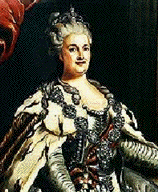May 2: Catherine the Great
Catherine the Great (1729)
It was on this date, May 2, 1729, in Stettin (in what is now Poland), that Sophia Friederica Augusta, Princess of Anhalt-Zerbst was born. After converting to Russian Orthodox, she was crowned Catharine II of Russia (Ekaterina Alexeevna) on 22 September 1762, after deposing her own husband — a husband she married at age 15 by political arrangement. Catharine was well-read and selected able advisors, so she proved more than suited to the task of ruling the largest empire in Europe. She would become known to history as Catharine the Great.
Her goal was to complete the Westernization of the Russian Empire that had ceased 37 years earlier at the death of another Romanov Emperor, Peter the Great. Empress Catharine was early on sympathetic with the French Revolution and its intellectual leadership: she corresponded with Voltaire and d'Alembert, invited Diderot to settle in Russia, and attempted to translate their Rationalist and humanist values to Russian soil. Rather than forcing Russian society into the service of the state, she succeeded to a degree in persuading the upper classes with some social justice and other reforms, although there was little in her purse for the serfs working the land.
The reigning-in of the Russian Orthodox church, which had begun under her ancestor Peter, she continued, transferring its wealth, property and personnel (and hence its power) to the state. She put restrictions on Roman Catholic proselytizing, which she found disruptive to her rule, even while she was issuing ukases or edicts promoting religious tolerance. The Jesuits, who had been suppressed by the Pope and kicked out of Catholic countries, found a refuge under Catharine's rule: she needed them to control her Polish territories.
In 1767 Catharine said, "The people are not created for us, but we for the people," and thereby directed an assembly, a first in Russian history, to draft a new code of laws to involve the educated classes in local administration in return for protection of their status and property rights, established (1765) the Free Economic Society to encourage the modernization of agriculture and industry, promoted trade and the development of underpopulated regions, and founded new towns (such as Odessa and Dnepropetrovsk). Catharine patronized arts and letters, permitted the establishment of private printing presses, and relaxed censorship. The University of Moscow and the Academy of Sciences became internationally recognized.
A skeptic with high humanitarian ideals, Catharine was not only a patron of literature; she wrote comedies, memoirs, and stories. In her letters she scorned what she called the "mummeries" of the Russian Church and professed Deism by saying, "I am one of the imbeciles who believe in God." But after the peasant rising (1773-74) under Pugachev, and having heard enough from expatriate nobles complaining of the excesses of the French Revolution, by 1790 Catharine became fearful of popular revolt. Demoralized at the reluctance toward reform in Russia from her will alone, Catharine imposed repressive measures to achieve stability, which in turn alienated the educated in Russian society. She died on 17 November 1796, but Russia was stronger, and the Churches weaker, for her having ruled 34 years.
Originally published May 2003 by Ronald Bruce Meyer.


